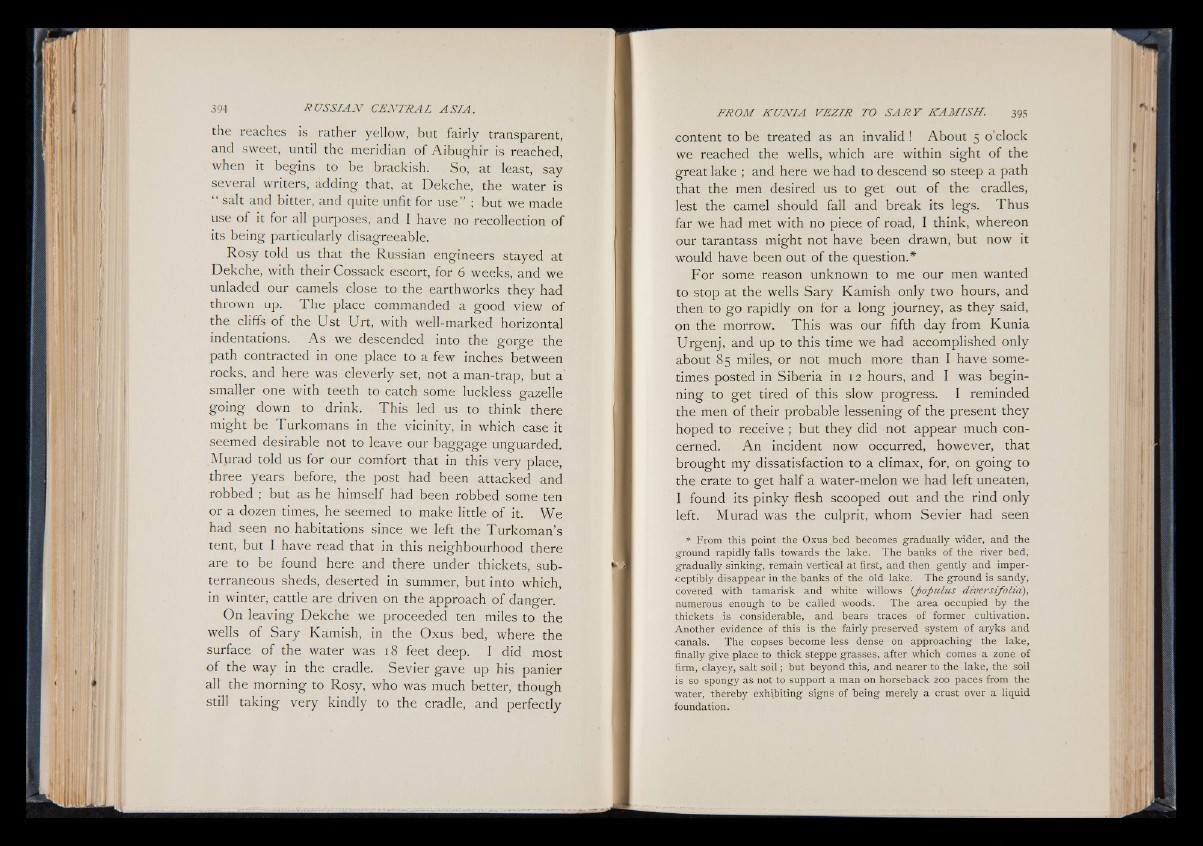
the reaches is rather yellow, but fairly transparent,
and sweet, until the meridian of Aibughir is reached,
when it begins to be brackish. So, at least, say
several writers, adding that, at Dekche, the water is
“ salt and bitter, and quite unfit for use” ; but we made
use of it for all purposes, and I have no recollection of
its being particularly disagreeable.
Rosy told us that the Russian engineers stayed at
Dekche, with their Cossack escort, for 6 weeks; and we
unladed our camels close to the earthworks they had
thrown up. The place commanded a good view of
the cliffs o f the Ust Urt, with well-marked horizontal
indentations. A s we descended into the gorge the
path contracted in one place to a few inches between
rocks, and here was cleverly set, not a man-trap, but a"
smaller one with teeth to catch some luckless gazelle
going down to drink. This led us to think there
might be Turkomans in the vicinity, in which case it
seemed desirable not to leave our baggage unguarded.
Murad told us for our comfort that in this very place,
three years before, the post had been attacked and
robbed ; but as he himself had been robbed some ten
or a dozen times, he seemed to make little of it. We
had seen no habitations since we left the Turkoman’s
tent, but I have read that in this neighbourhood there
are to be found here and there under thickets, subterraneous
sheds, deserted in summer, but into which,
in winter, cattle are driven on the approach o f danger.
On leaving Dekche we proceeded ten miles to the
wells of Sary Kamish, in the Oxus bed, where the
surface o f the water was 18 feet deep. I did most
o f the way in the cradle. Sevier gave up his panier
all the morning to Rosy, who was much better, though
still taking very kindly to the cradle, and perfectly
content to be treated as an invalid ! About 5 o’clock
we reached the wells, which are within sight of the
great lake ; and here we had to descend so steep a path
that the men desired us to get out of the cradles,
lest the camel should fall and break its legs. Thus
far we had met with no piece of road, I think, whereon
our tarantass might not have been drawn, but now it
would have been out of the question.*
For some reason unknown to me our men wanted
to stop at the wells Sary Kamish only two hours, and
then to go rapidly on for a long journey, as they said,
on the morrow. This was our fifth day from Kunia
Urgenj, and up to this time we had accomplished only
about 85 miles, or not much more than I have sometimes
posted in Siberia in 12 hours, and I was beginning
to get tired of this slow progress. I reminded
the men of their probable lessening of the present they
hoped to receive ; but they did not appear much concerned.
An incident now occurred, however, that
brought my dissatisfaction to a climax, for, on going to
the crate to get half a water-melon we had left uneaten,
I found its pinky flesh scooped out and the rind only
left. Murad was the culprit, whom Sevier had seen
* From this point the Oxus bed becomes gradually wider, and the
ground rapidly falls towards the lake. The banks of the river bed;
gradually sinking, remain vertical at first, and then gently and imperceptibly
disappear in the banks of the old lake. The ground is sandy,
covered with tamarisk and white willows {J>opulus diversifolia),
numerous enough to be called woods. The area occupied by the
thickets is considerable, and bears traces of former cultivation.
Another evidence of this is the fairly preserved system of aryks and
canals. The copses become less dense on approaching the lake,
finally give place to thick steppe grasses, after which comes a zone of
firm, clayey, salt soil; but beyond this, and nearer to the lake, the soil
is so spongy as not to support a man on horseback 200 paces from the
water, thereby exhibiting signs of being merely a crust over a liquid
foundation.